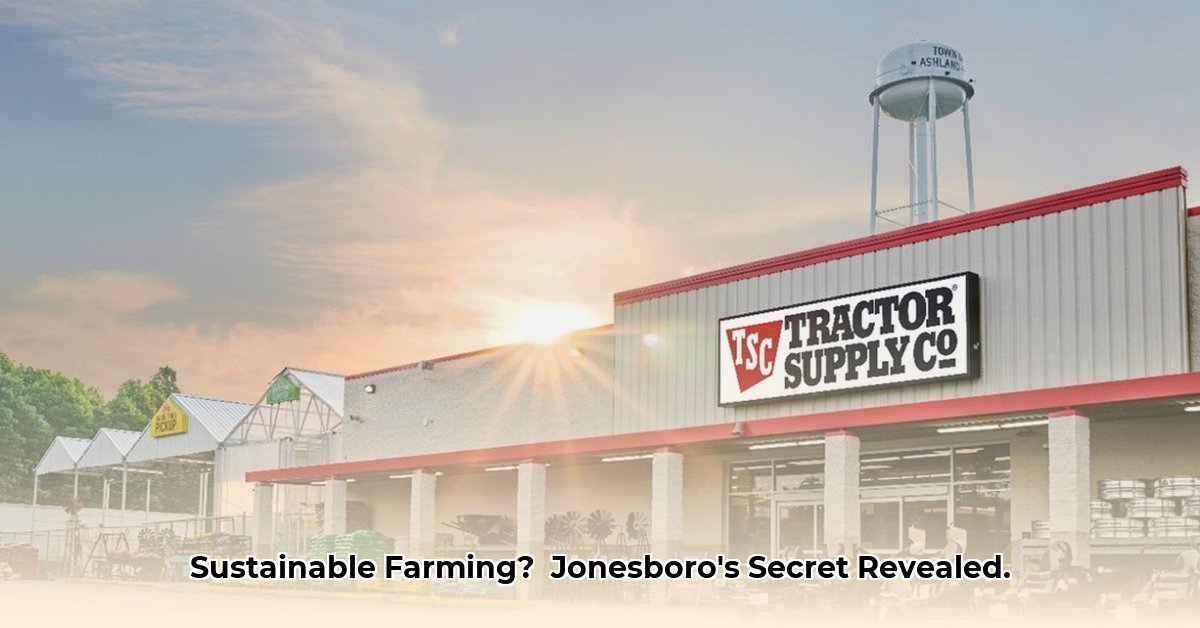
Jonesboro, Arkansas, is served by a Tractor Supply Company (TSC) store, a significant supplier for local farmers and ranchers. This article assesses TSC's contribution to sustainable agriculture in the Jonesboro area, highlighting both its potential and the need for greater transparency in its practices. We examine the products offered, identify significant data gaps, and propose actionable steps for various stakeholders to foster more environmentally responsible farming. For examples of other TSC stores, see this example.
What Jonesboro AR Tractor Supply Offers Farmers
The Jonesboro TSC store offers a wide array of products relevant to agriculture, including fencing supplies, livestock feed, tools, and equipment. The availability of organic feed and tools for conservation tillage (e.g., no-till seed drills) suggests potential for supporting sustainable practices. However, assessing the true extent of this contribution requires a deeper investigation into several crucial areas. For instance, the sourcing of these products, and the materials used in their packaging and transportation are key unknowns. Does the store actively promote sustainable farming techniques? Does it offer workshops or educational resources on this matter? Without comprehensive information, we lack a clear understanding of TSC's role in supporting environmentally sound agriculture.
Uncovering the Sustainability Story: What We Don't Know
A significant gap exists in publicly available data regarding TSC's sustainability efforts in Jonesboro. Crucial information remains unavailable to fully assess their environmental impact. Key questions include:
- Product Sourcing: Where are the products sourced? Are suppliers adhering to sustainable practices? What is the carbon footprint of their supply chain?
- Packaging: What materials are used in packaging? Are they recyclable or compostable? What is the waste generated from packaging?
- Waste Management: How does TSC handle waste from its operations? What measures are taken to minimize waste?
- Energy Consumption: What energy sources power the store? What measures are implemented to reduce energy consumption?
This lack of transparency hinders any comprehensive evaluation of TSC’s overall contribution to sustainable agriculture.
Taking Action: Steps Towards a More Sustainable Future
Several key actions are recommended to improve transparency and encourage sustainability.
For Jonesboro AR Tractor Supply:
- Conduct a comprehensive sustainability audit: Evaluate the entire supply chain, from sourcing to waste disposal, including energy usage. This audit should include a detailed assessment of greenhouse gas emissions throughout the supply chain.
- Publish a detailed sustainability report: This report should clearly outline TSC's sustainability goals, including specific, measurable, achievable, relevant, and time-bound (SMART) targets. It should be made publicly available for easy access.
- Expand the availability of sustainable products: Actively seek and offer more organic feeds, conservation tillage tools, and eco-friendly products. Clearly label these products as sustainable. Offer incentives to suppliers who follow sustainability best practices.
For Local Farmers:
- Engage directly with TSC: Inquire about sourcing practices and request greater transparency on sustainability efforts. Provide feedback on the need for more sustainable options.
- Share best practices: Educate TSC staff on environmentally responsible farming techniques and the importance of using sustainable supplies.
- Support sustainable products: Prioritize purchasing sustainable products from TSC to incentivize their expansion of such offerings.
For Environmental Groups:
- Partner with TSC and local farmers: Conduct independent assessments and offer expert advice on improving sustainable practices.
- Conduct public awareness initiatives: Educate the community about sustainable agriculture and encourage demand for transparency from businesses.
- Advocate for stronger regulations: Support policies that incentivize corporate sustainability.
For Consumers:
- Ask about product origins and sustainability: Engage with TSC staff to inquire about sourcing and sustainability practices.
- Support transparent companies: Choose businesses with clear commitments to sustainability.
- Practice reduce, reuse, recycle: Minimize personal environmental impact.
Conclusion: Building a Sustainable Future Together
TSC has the potential to significantly contribute to sustainable agriculture in Jonesboro. However, this requires transparency, collaborative efforts, and a shared commitment to environmental responsibility. Ongoing efforts from all stakeholders are essential to create a more sustainable agricultural future for the region. The journey towards sustainability is a continuous process requiring open communication and proactive engagement.